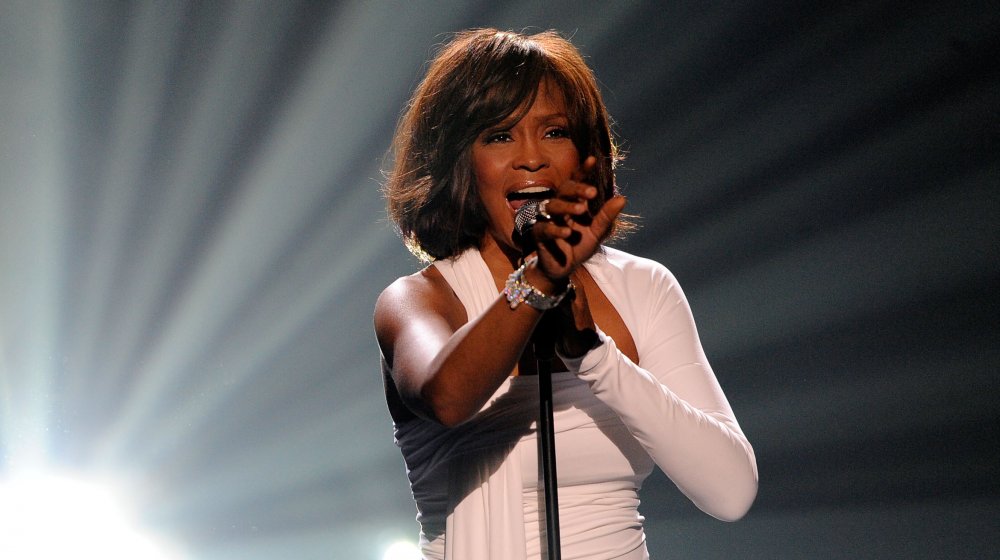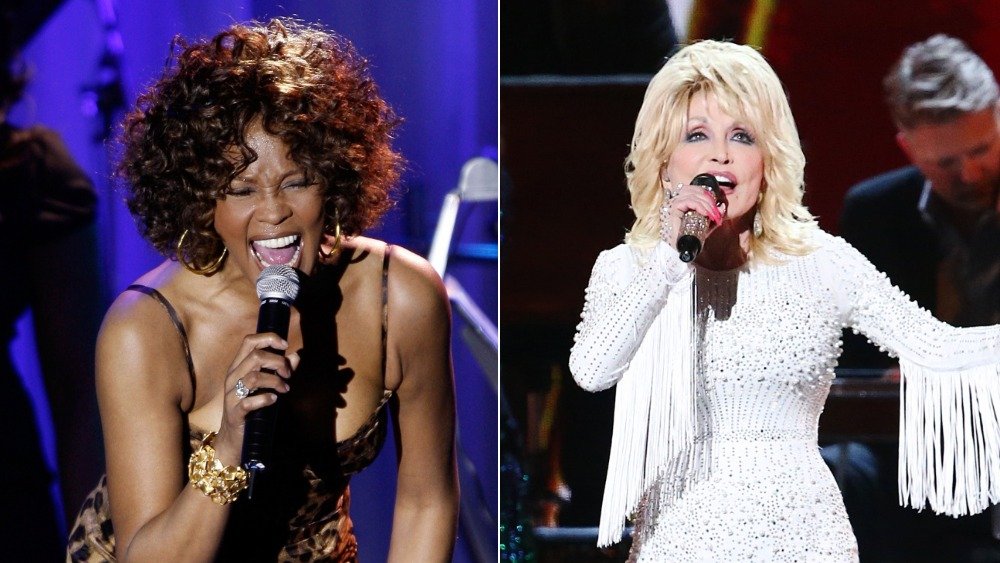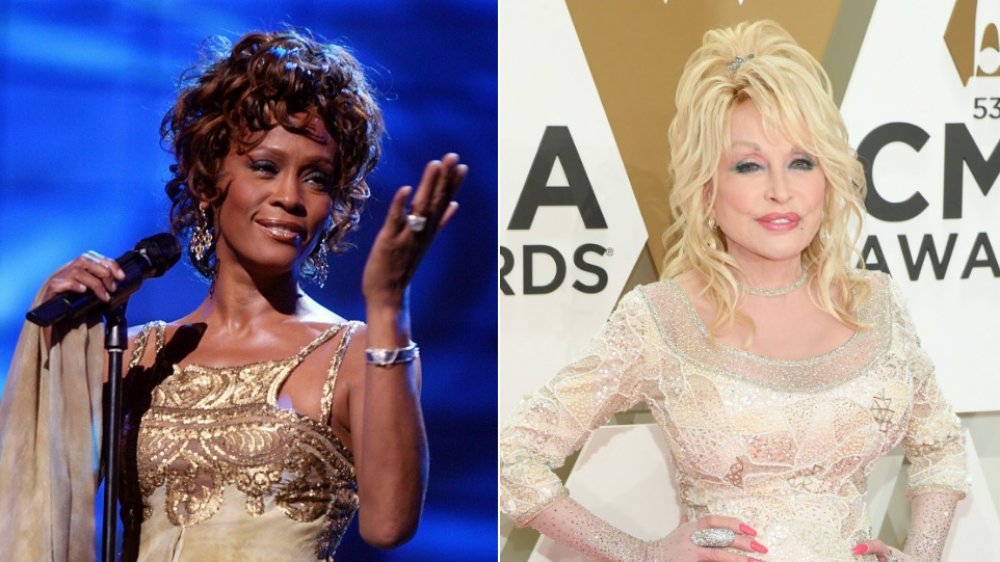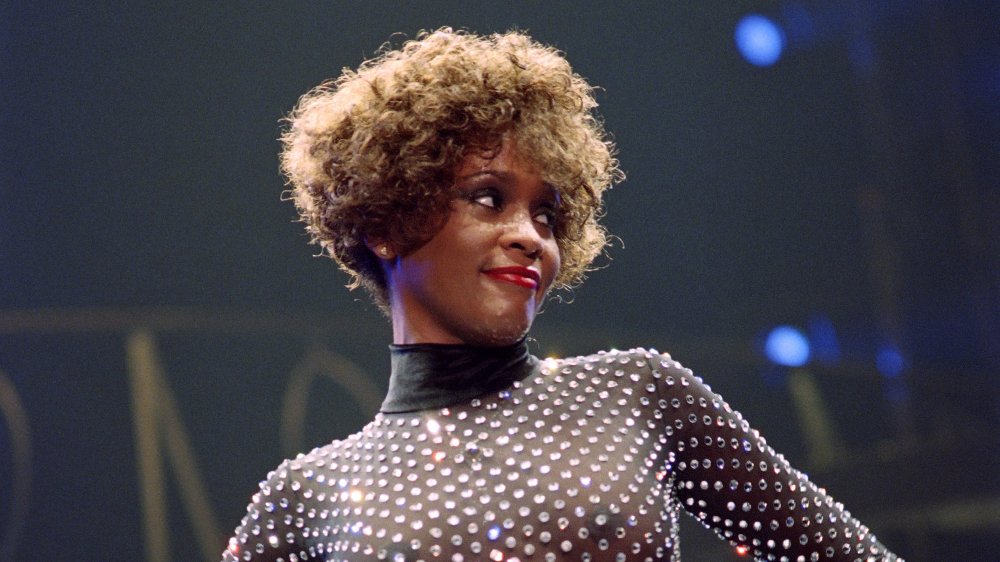The Real Reason Whitney Houston Covered 'I Will Always Love You' By Dolly Parton
Even if you're somehow not a huge fan of Whitney Houston, you've almost certainly heard the song she's most famous for: the soul ballad "I Will Always Love You." Recorded in 1992 as the signature single for the film The Bodyguard, which co-starred Houston alongside Kevin Costner, "I Will Always Love You" is one of the best-selling singles of all time, according to Billboard.
While Houston's haunting a cappella intro might be the first thing you think of when this quintessential love song springs to mind, that's actually not how the song initially sounded — and Houston was hardly the first to ever sing it. The song first hit the airwaves almost 20 years prior as a country song, written and performed by the patron saint of Dollywood herself, Dolly Parton.
Though Houston might've popularized the tune with her powerhouse vocals, soaring high notes, and uniquely touching sense of sorrow, it was Parton who created the framework for it. And the reason Houston sang and recorded the song for The Bodyguard in the first place was, like many great historical events, a total accident.
Houston wasn't the only artist to cover Parton's ballad
Strangely enough, Dolly Parton's original version of "I Will Always Love You" wasn't the impetus for Whitney Houston's cover. In fact, the cover originated from two unlikely sources: actor Kevin Costner and rock star Linda Ronstadt.
According to The Hollywood Reporter, the song that became the apotheosis of Houston's career was never originally intended to be on The Bodyguard's soundtrack. Houston had originally planned on covering the 1966 Motown ballad "What Becomes of the Brokenhearted" by singer Jimmy Ruffin, but her plans were foiled after production caught word that the same song was set to be used for the score of the movie Fried Green Tomatoes. Scrambling to find a replacement, co-star Kevin Costner offered up a version of "I Will Always Love You" covered by another performer in 1975 — the aforementioned Ronstadt. With Parton's blessing, the team moved forward, per CMT News.
Houston drew from both Ronstadt and Parton's versions for her cover, and the resulting song ended up being the perfect fit for the film. As The Hollywood Reporter''s Joe Levy put it, "the doomed romance of the lyric, and the way it's at pains to find good wishes in sadness, fit the interracial Romeo-and-Juliet love story of the film much better."
Besides Ronstadt and Houston, a number of artists have tried their luck at their own versions of the soulful ode, including country singers Kenny Rogers and LeAnn Rimes and pop icon Beyoncé.
Parton was "shattered" after hearing it at Houston's funeral
In an April 2012 interview with Nightline (via The Hollywood Reporter), which singer-songwriter Dolly Parton gave only days after Whitney Houston died by accidental drowning in her bathtub, the country music star expressed her grief over Houston's unexpected passing. She said that hearing "I Will Always Love You" at Houston's funeral nearly broke her.
"[It] just shattered me to hear that song played under those conditions," Parton said at the time. "I thought my heart was gonna stop. It just pierced me like a knife."
Parton also expressed a sense of gratitude for how her song — originally released in 1974 and then re-recorded for the soundtrack for The Best Little Whorehouse in Texas in 1982, which the country singer starred in — would forever link the country star to the late Houston.
"It's just — I can't explain that feeling, to think that that was so final for her, and that that was my words and my feeling — I would forever be so connected to her," Parton added.
The legacy of I Will Always Love You lives on
Even if it was never intended to do so, Whitney Houston's version of "I Will Always Love You" is symbolic of a sea change in the American cultural landscape in ways that still reverberate today. Though the song was originally written for audiences of country music, Houston's soulful, gospel-infused take made it emblematic of something larger than music.
As journalist and critic Joe Levy wrote in an analysis of the ballad for The Hollywood Reporter, the 1992 version of "I Will Always Love You" shattered expectations of what was possible in music when it came to crossover appeal to different racial groups. Levy wrote, "Even if you never knew this was a country cover, it still crosswires genres and audiences and upends the notion that black and white music (and audiences) don't talk directly to each other." In retrospect, it's meaningful that Houston's cover was released in the same year as the Los Angeles riots, which erupted after a number of white police officers were acquitted for beating Rodney King, a black man.
These days, crossover hits like Lil Nas X's "Old Town Road" are proof that the legacy of "I Will Always Love You" lives on. With Houston's unforgettable a cappella, it's unlikely that fans will ever stop singing this special song.




